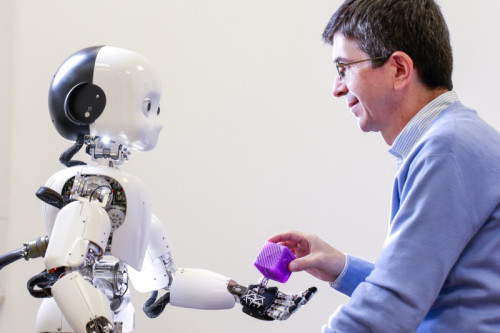How тАШsocial robotsтАЩ could help with health, independence, and reducing loneliness in older communities
With an ageing population and a strained care sector, could robots help? In collaboration with Age UK, ҐҐҐ╜╬╤╩╙╞╡ researchers are exploring how social robots might become companions, helping with health, independence and reducing loneliness.
It was the same as every other bingo night at Brunswick Village Extra Care in ҐҐҐ╜╬╤╩╙╞╡, except for one difference тАУ Pepper the robot was calling the numbers.
Pepper, who not only has human linguistic skills, but with recent developments in AI can now interact with people and even read emotions, is part of a project partnership between Age UK and ҐҐҐ╜╬╤╩╙╞╡тАЩs Faculty of Science and Engineering.
They believe that the тАШsocial robotsтАЩ theyтАЩre working on, can be used as companions to support health and care in older adults, as well as children with some disabilities.
Sue Agar, Service Development Manager at Age UK ҐҐҐ╜╬╤╩╙╞╡ explains: тАЬYou can see the concern disappear quite quickly when they have the chance to speak with Pepper. ItтАЩs like a barrier comes down, and before long they treat Pepper like they would any other visitor.тАЭ
The robots arenтАЩt yet fully autonomous тАУ Pepper is accompanied by staff and students from the University тАУ but thereтАЩs a huge amount they can do independently. Pepper can communicate seamlessly with residents, understanding what they say and responding appropriately.
And this isnтАЩt the first robot visitor to Brunswick Village, previously a smaller model had been brought in to demonstrate a Tai Chi session.
Leading the project is Professor Angelo Cangelosi, whose father suffered from dementia, and who sees a real potential in the future role this technology could play.
He explains: тАЬWe live in a society with ever increasing needs for integrated health and social care solutions, to support healthy ageing. Social robots and AI can support such needs, within a human-centric approach putting people at the core of the development of trustworthy care solutions.тАЭ
Though robots arenтАЩt going to be a substitute for nurses and carers, Professor Cangelosi believes they can be used as a tool to support these professions. Potential roles could include monitoring illnesses in patients, helping people to access medications, or simply being a companion within the home.
Sue Agar, Service Development Manager at Age UK ҐҐҐ╜╬╤╩╙╞╡ adds: тАЬThereтАЩs a huge amount of good the robots can do keeping people safe. The social intelligence is so important too, because loneliness is a real issue and companionship тАУ being able to have conversation and interaction тАУ makes such a difference.тАЭ
With carers already under significant strain due to staff shortages, and with an ageing population very likely to increase in the years ahead, Professor Cangelosi and his team are working on robots that could play a vital role in reducing the growing pressure on the care sector.
[The University of ҐҐҐ╜╬╤╩╙╞╡ has received a prestigious grant from the European Research Council to support this project, focussed on helping robots to understand more abstract concepts.]

Meet the researcher
Angelo Cangelosi, Professor of Machine Learning and Robotics and Co-Director of the ҐҐҐ╜╬╤╩╙╞╡ Centre for Robotics and AI, is an internationally recognised expert in social robotics and AI. He was recently selected for the award of the European Research Council Advanced grant (UKRI funded), and to date has over 400 publications, with ┬г40m of secured research grants. His research interests are in cognitive and developmental robotics, neural networks, language grounding, human robot-interaction and trust, and robot companions for health and social care.
Read his papers
-
01October2025| 15:14 Europe/London75 years on from the 'Turing Test', ҐҐҐ╜╬╤╩╙╞╡ leads the way in AI res..
-
01October2025| 14:20 Europe/LondonA trailblazing history: driving the AI revolution
-
23September2025| 17:33 Europe/LondonGreener computing in тАШbig scienceтАЩ is possibleтАж if we change our data ..
